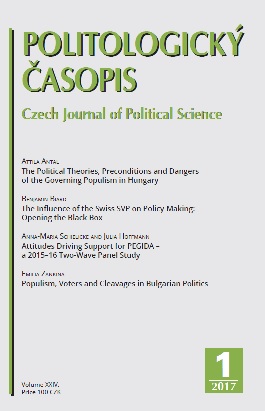Populism, Voters and Cleavages in Bulgarian Politics
Populism, Voters and Cleavages in Bulgarian Politics
Author(s): Emilia ZankinaSubject(s): Politics / Political Sciences
Published by: Masarykova univerzita nakladatelství
Keywords: voters; populism; cleavages; Eastern Europe; Bulgaria
Summary/Abstract: The growing success of populist parties from across the political spectrum in Europe calls for an examination of the link between populist parties and voters and the new (if new indeed) cleavages that such parties exploit. Scholars have pointed to the erosion of traditional cleavages as one reason for the success of populist parties. Such analysis fits well with the established democracies of Europe but has little application in the East European context. Traditional cleavages have taken root in few places in Eastern Europe before communist takeover and became even less relevant following four and a half decades of communist rule. With the fall of communist regimes across Eastern Europe, the only meaningful division within society was that of anti-communists and supporters of the old regime. Similarly, concepts of Left and Right had (and to a great extend continue to have) little relevance in the East European context where the Left came to be dominated by former communist parties and the Right engulfed an ideologically incoherent opposition. The stronger the former communists were (such as in Bulgaria and Romania) the more fragmented the Right was, as it was the only available space for political competition. The present paper aims to examine voter support for populist parties in Bulgaria and analyze on the cleavages that those parties exploit or create. Thus, the paper examines the impact of populist parties on the political landscape in terms of the changes that those parties result in in voter behavior and cleavage formation. The paper utilizes exit-poll surveys, focusing on voter demographic profiles and the mobility of the vote. The findings indicate that populist parties are most successful in mobilizing non-voters when they first appear, but that their support quickly wanes afterwards. At the same time, there is voter mobility from one populist party to a newer populist party, which makes for a prolong trend of populist politics.
Journal: Politologický časopis - Czech Journal of Political Science
- Issue Year: XXIV/2017
- Issue No: 1
- Page Range: 56-71
- Page Count: 16
- Language: English

